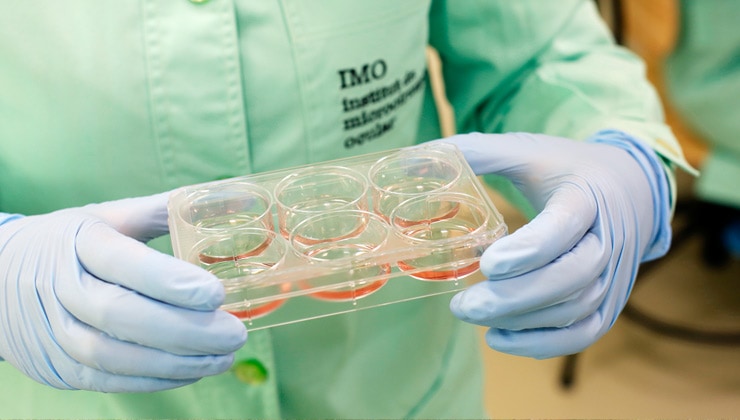Pilot project with CRISPR to treat hereditary retinal diseases
26 de September de 2019
Modifying the DNA of cells with specific mutations that cause hereditary eye diseases is closer to becoming a reality thanks to research projects like the one carried out by the IMO Foundation, which has started the first CRISPR tests for retinitis pigmentosa.
According to Dr. Esther Pomares, coordinator of the IMO Genetics Department, “the CRISPR genome editing technique is revolutionizing many areas of genetic engineering (such as the treatment of cancer or autoimmune, metabolic and neurodegenerative disorders). Our purpose is to apply it now in the field of ophthalmology to reverse the loss of vision caused by retinal dystrophies, which are currently incurable, such as retinitis pigmentosa”.
CRISPR for Retinitis Pigmentosa
In order to correct the mutations that cause this disease, CRISPR repairs the DNA by inserting – through genetic engineering – a healthy, artificially generated DNA guide or mould into the altered cell, so that the patient’s own cell can copy it and replace the information. As explained by the IMO Foundation research team: we applied “molecular scissors” which cut the sequence of the altered gene with great precision so that it can later be repaired by the own cell generating a copy of the healthy gene. “In the Cell Culture and Experimentation in New Therapies Area of IMO we have started to successfully test the performance of these cuts in stem cells derived from patients with retinitis pigmentosa”, points out Dr. Judit Domingo, researcher of the IMO Foundation.

The IMO laboratory is equipped for the development of cell cultures and the testing of gene therapies, one of the most promising treatment approaches for retinitis pigmentosa and other retinal dystrophies.
Stem cell collection
In order to make these trials with CRISPR possible, the IMO Foundation project -financed by Fundación Bancaria “la Caixa”- has first required the achievement of an important milestone: the obtention of stem cells derived from patients affected by retinitis pigmentosa. These induced pluripotent stem cells or iPS cells have been obtained from a sample of skin cells, which have been “deprogrammed” in the IMO laboratory by means of complex protocols imported from the United States (Columbia University, New York).
As a result, iPS cell lines have been obtained from three patients with retinitis pigmentosa, with different altered genes responsible for the disease (out of more than 100 associated with this retinal dystrophy). “Each mutation has a different impact on the cell and, when it comes to correcting the sequence of the defective gene for a healthy one -using technologies such as CRISPR-, a personalized gene therapy is needed”, explains Dr. Pomares.
In the Stem Cell Research journal
The main objective of this project is to gain a better understanding of the effects of these mutations and to initiate experimentation with new therapies. The project also includes patients with other retinal dystrophies in addition to retinitis pigmentosa (such as Stargardt’s disease, Best’s disease and achromatopsia). For all of them, stem cells have already been obtained. These advances have been published in the Stem Cell Research journal, and will culminate, in the last stage of the research, with the differentiation of these cells to retinal cells. “By differentiating iPS cells we will be able to reproduce in vitro a model of the retina, something that is not possible to obtain directly from patients since this tissue does not regenerate”, the geneticists conclude.
IMO Institute of Ocular Microsurgery
Josep María Lladó, 3
08035 Barcelona
Phone: (+34) 934 000 700
E-mail: international@imo.es
See map on Google Maps
By car
GPS navigator coordinates:
41º 24’ 38” N – 02º 07’ 29” E
Exit 7 of the Ronda de Dalt (mountain side). The clinic has a car park with more than 200 parking spaces.
By bus
Autobus H2: Rotonda de Bellesguard, parada 1540
Autobus 196: Josep Maria Lladó-Bellesguard, parada 3191
Autobuses H2, 123, 196: Ronda de Dalt – Bellesguard, parada 0071
How to arrive at IMO from:
IMO Madrid
C/ Valle de Pinares Llanos, 3
28035 Madrid
Phone: (+34) 910 783 783
See map in Google Maps
Public transport
Metro Lacoma (líne 7)
Autobuses:
- Lines 49 & 64, stop “Senda del Infante”
- Line N21, stop “Metro Lacoma”
Timetables
Patient care:
Monday to Friday, 8 a.m. to 9 p.m.
IMO Andorra
Av. de les Nacions Unides, 17
AD700 Escaldes-Engordany, Andorra
Phone: (+376) 688 55 44
See map in Google Maps
IMO Manresa
C/ Carrasco i Formiguera, 33 (Baixos)
08242 – Manresa
Tel: (+34) 938 749 160
See map in Google Maps
Public transport
FGC. Line R5 & R50 direction Manresa. Station/Stop: Baixador de Manresa
Timetables
Monday to Friday, 09:00 A.M – 07:00 PM




